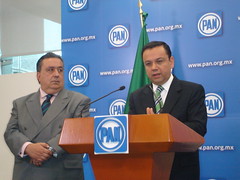
For PAN, win would restore pride, power
BY DAVID AGREN
The News
The National Action Party suffered through a miserable 2008, performing terribly in the five states that held local elections. But that hardly deterred PAN president Germán Martínez from going on the offensive and predicting a reversal of fortune in 2009, when the country holds midterm elections and six governor's offices are up for grabs. The turnaround, he said, would include victory in Nuevo León.
"I don't have the slightest doubt that we're going to recapture Nuevo León," he told reporters in December.
"The PAN is going to return to governing Nuevo León, and this nightmare of a local government that [the state] is suffering through will only be a historical footnote."
On July 5, Nuevo León voters will prove Martínez right or wrong. But the PAN president has repeatedly signaled that his party is betting heavily on taking back the northern state from the incumbent Institutional Revolutionary Party, or PRI.
The PAN faces a stern test in Nuevo León and has done itself few favors since Martínez first predicted electoral success.
For weeks, the party has been bickering over candidate nominations for elections in several key municipalities as well as the gubernatorial race. And a slumping economy - which is hurting the governing party in national polls, too - also threatens to dent PAN prospects in Nuevo León.
"They're probably not going to do so well in the [nationwide midterm] elections," said Jeffrey Weldon, a political science professor at ITAM. "But [PAN] can claim a moral victory if they win back a state."
The PRI captured Nuevo León in 2003 under similar economic circumstances to those today. That year, the centrist party took advantage of a troubled economy and a less-than-powerful rival to claim the governor's office and victory in the federal midterm elections.
But PRI Gov. Natividad González has since drawn underwhelming job performance reviews. He has taken a particular beating for his handling of security issues, said University of Monterrey political science professor Jose Luis Berlanga Santos. And in 2006, the PAN leveraged increasing concerns over rising insecurity in Nuevo León - and PRI divisions over presidential candidate Roberto Madrazo - to claim a majority in the state legislature.
Public opinion surveys showed continuing dissatisfaction with the PRI during the second half of González's administration due to a rash of drug-related killings in 2007 and the state's notoriety for auto theft and bank robbery.
"The governor has been viewed as weak," Berlanga Santos said. "Both [the economy and security] are the main issues, but here, people are definitely worried more about security."
TIGHT RACE
Still, public opinion polls show a narrowing of voter preference over the past six months. A February poll in the newspaper El Norte put the race in a statistical dead heat with 37 percent backing PRI candidate Rodrigo Medina and 35 percent opting for PAN candidate Sen. Fernando Elizondo Barragón. As a result, politicians from both sides have been hesitant to predict victory.
"It's very competitive," Nuevo León PAN Deputy Cristián Castaño told The News. "If the PRI boasts that it's going to win, that's wrong. If the PAN boasts that it's going to win, that's also wrong."
The unveiling of the candidates in February failed to sway public opinion, making it likely that campaign performance and party unity will decide the election.
STAYING UNITED
Unity has been elusive in Nuevo León for the PAN and to a lesser degree, the PRI.
The PAN originally split over the prospect of forming a coalition with the New Alliance party. (No deal was ever reached.)
The national PAN leadership then bypassed the primary election process and tapped Elizondo, a 60-year-old former interim governor, as the one and only candidate.
The three rival candidates for the PAN nomination scorned the process, but fell silent after the announcement.
Some have defended the process, which critics have compared to the old ways of the PRI.
Castaño, for instance, said that the selection process was necessary, in part, due to flaws in the PAN membership list. Analysts, meanwhile, say that the party mostly likely wanted to avoid the possibility of polemic Monterrey Mayor Adalberto Madero winning the nomination.
The PRI, by comparison, experienced less conflict in selecting a candidate. The party opted for Medina after the local PRI leadership brokered a deal. The party, according to PRI Nuevo León Deputy Francisco Rivera Bedoya, also wanted a young candidate. Medina is just 36, but he has already held the No. 2 position in González's administration.
Possibly the only internal PRI spat to go public was a dispute between several unions over the divvying up of candidates for municipal races outside of the Monterrey area.
With the race currently so tight, analysts say that the party that keeps a lid on internal conflict will most likely win. This applies particularly to the PAN, they say.
"The key for the PAN is to make sure that they don't split between now and the election," Weldon said.


No comments:
Post a Comment